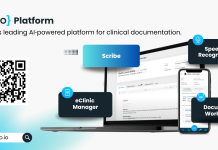Director & Co Founder Fergus Magennis at Invoka Consulting explores how economic uncertainty is affecting organisations and the public sector, and how digital transformation can help
The global economy is facing unprecedented levels of economic uncertainty as countries grapple with financial threats and their populations deal with the cost-of-living crisis and global inflation. Across the Tech sector, we’re seeing companies take the opportunity to streamline their organisations, reduce headcount and prioritise investment on key projects that are core to their operations. Every Pound, Euro and Dollar matters in a crisis, so having a handle on what’s in the coffers is crucial for survival.
In times of economic uncertainty, some organisations look to safety, relying on tried and tested revenue streams to provide security while market confidence is low. Other companies capitalise on the opportunity to innovate and exploit gaps in the market to develop new approaches, breaking down traditional business models in favour of agile and highly customer-centric products & services.
There’s no silver bullet to solving economic uncertainty
As businesses go through this exercise to look at their operating models to identify sources of waste and opportunities to reduce spending, it’s easy to think of new technology as a cost, rather than a cost-saving mechanism.
However, many of the tools still being deployed today serve one specific function: HR, financial management, resource management, project management, or asset management.
All siloed applications are incapable of working together and lacking in what are now seen as fundamentals in the SaaS world: versatility and flexibility.
Over the last 10 years, a new wave of collaboration tools has emerged, breaking down the lines between these systems and adding layers of connectivity that turn once disparate tools into connected, cohesive systems that share information, automate processes and provide real-time visibility of data across teams and organisations.
As we enter a year of economic uncertainty, it’s the organisations that are able to look inwards and understand how funds are being allocated who will ultimately be able to reallocate resources effectively. Protecting your organisation from economic shock becomes a much easier task when we can see the data and act accordingly.
Utilising Smartsheet to transform organisations towards efficiency
One of the tools leading the charge in the space is Smartsheet. Its flexibility and versatility make it a leader in the Collaborative Work Management (CWM) segment, helping to transform organisations across industries into more efficient collaborators and therefore more effective teams. Rather than an out-of-the-box, static tool, Smartsheet is a set of features that adapts to your business and how your teams work today. When combined with its ability to standardise processes and automate them at scale, it becomes a platform that is capable of revolutionising how you work.
One of the key advantages of a tool like Smartsheet is the number of use cases it can be deployed for in any one organisation. One team can manage projects more efficiently and provide automated and real-time project and portfolio reporting. Another team can use it to collaboratively manage complex annual financial reporting and budget administration. It’s this malleability that provides teams with the ability to develop solutions that meet their particular requirements.
Our experience working with the public sector has given us valuable insight into the specific challenges that government and public sector bodies face. One of the most common pieces of feedback we receive is that people feel they spend too much time in meetings that could be avoided if better ways of communicating and collaborating were available. By providing teams with real-time dashboards and reports, people feel better informed. By enabling individuals to share updates quickly and notify specific teams or colleagues of progress or issues, unnecessary meetings just to provide updates can be removed, allowing time to focus on strategic goals, critical problem solving or just leaving the office a little bit earlier.
How do we solve the increasing administrative burden facing organisations?
The second most received complaint from our partners in the public sector is the increasing administrative burden facing teams and organisations. Whether aligning with ever-changing regulations or meeting the increasing need for financial transparency, valuable time is spent gathering, collating and formatting data unnecessarily when the tools now exist to allow us to set up reporting structures initially and have the data populated live based on regular updates provided by action owners and team leaders.
Regardless of the ultimate objective, time, and effort cost. Reclaiming inefficiently used hours not only serves to reduce the stress on employees but also enables them to focus on the key parts of their role that require their skill and experience. By automating routine daily tasks and communication, we’re moving closer to a truly symbiotic relationship between people and technology, letting the tools add real value to business operations and allowing organisations to leverage the valuable skills within their workforce.
We’ve helped companies rapidly improve their ways of working, reduce costs, and increase collaboration through the implementation of Smartsheet. Having a platform that adapts to the needs of the organisation while providing individual users with the ability to create new processes quickly and easily is seen more and more as a must-have. The move away from traditional spreadsheets and presentations is accelerating, and might just make the difference in
these challenging times.
See a demo of Smartsheet
Try Smartsheet for free

This work is licensed under Creative Commons Attribution-NonCommercial-NoDerivatives 4.0 International.











